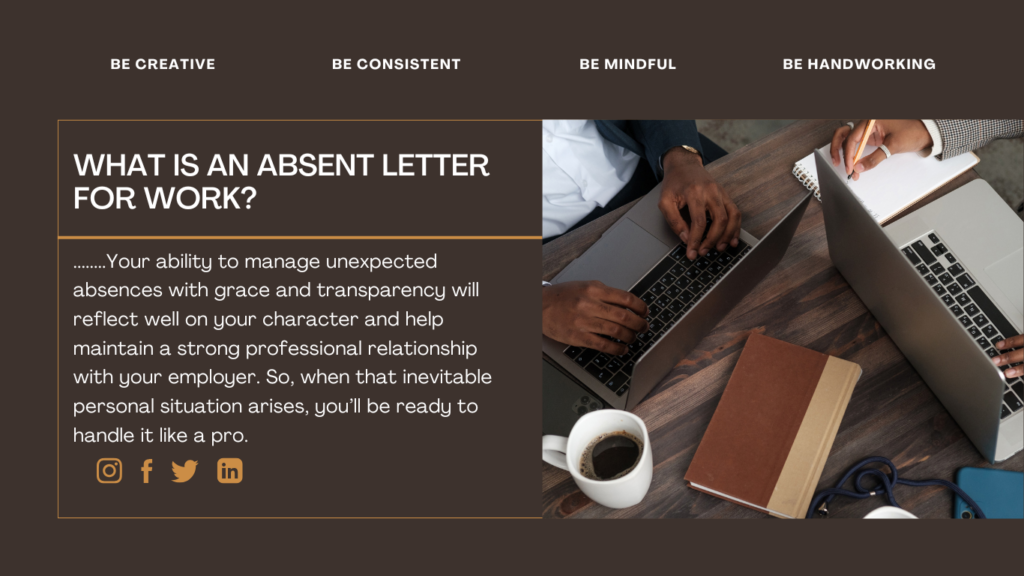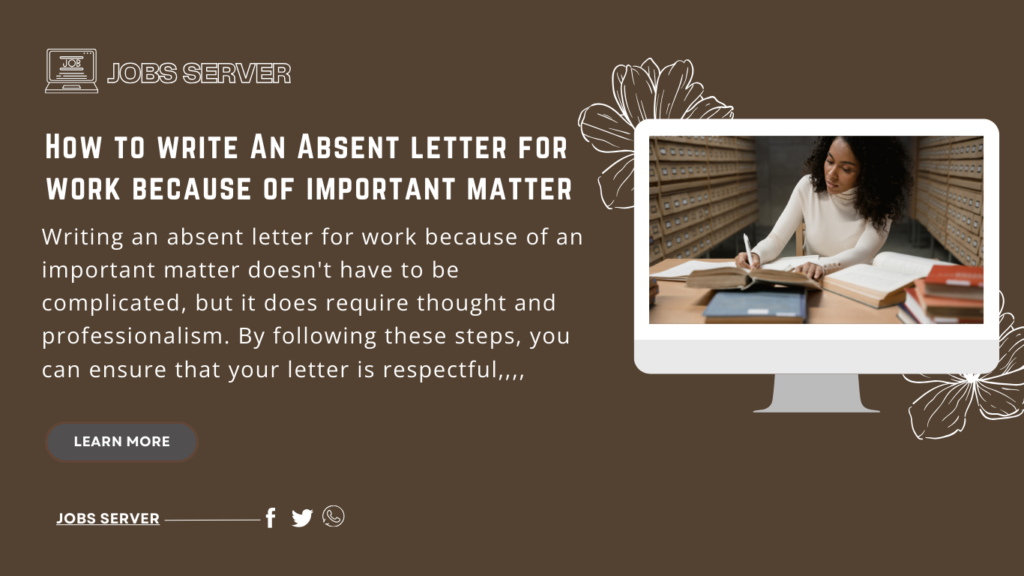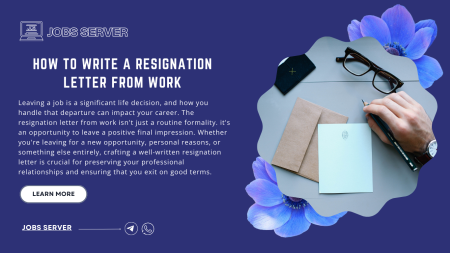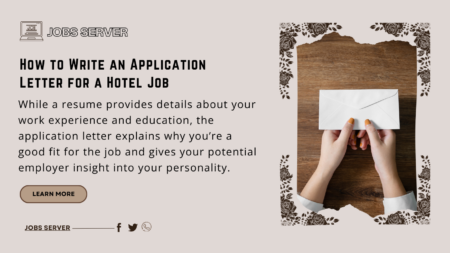Step By Step On How To Write An What Is An Absent Letter For Work?
An absent letter, also known as a leave of absence letter, is a formal written document submitted to your employer when you’re unable to attend work due to an important matter. This could be for personal reasons, medical emergencies, family obligations, or other significant events that require you to be away from your job. The purpose of the letter is to inform your employer about your absence in advance (if possible) and explain why you need the time off. It’s essential to be clear, concise, and professional, but also honest about the situation.
INTRODUCTION
In the hustle of professional life, there will come a time when personal or urgent matters demand your attention, leaving you no choice but to be absent from work. Whether it’s a family emergency, a sudden illness, or a long-planned event, understanding how to properly communicate your absence can make a significant difference in how your employer and colleagues perceive you. Writing an absent letter is one way to ensure that you remain in good standing while dealing with personal priorities. But how do you make sure this letter is written in a way that is both professional and empathetic, while still focusing on the important matter at hand?
In this article, I will provide an easy-to-follow, step-by-step guide on writing an absent letter for work due to an important matter. It will also touch on the potential disadvantages and advantages of submitting such a letter, along with personal insights into how this letter can impact your relationship with your employer.

IMPORTANCE OF WRITING AN ABSENT LETTER
Communication in the workplace is crucial. When you cannot attend work for any reason, letting your employer know through a written letter (whether an email or a physical document) shows responsibility and respect. It also helps prevent misunderstandings or complications that might arise from unexplained absences. Not only does an absent letter give your boss a clear picture of why you are unavailable, but it also helps you maintain professionalism, especially in situations where you need extended time away.
Why It Matters:
- Writing An Absent Letter Keeps Records Straight: Your absence is documented formally, reducing the likelihood of confusion.
- Writing An Absent Letter Builds Trust: Being upfront about your situation demonstrates integrity and transparency, which are qualities that employers value.
- Writing An Absent Letter Shows That You Plan: When you notify your employer in advance (if possible), it allows them to make necessary adjustments in your absence.
- ALSO CHECK
- Step By Step On How To Write An Application Letter For A Hotel Job
- Step By Step On How To Write A Business Proposal For Funding
- Step By Step On How To Write A Business Proposal For FundingStep By Step On How To Write An Argumentative Essay
- Step By Step On How To Write An Argumentative EssayStep By Step On How to Write A Curriculum Vitae for A Job
- Step By Step On How To Write A Good Guarantor Letter
STEP-BY-STEP GUIDE ON HOW TO WRITE AN ABSENT LETTER FOR WORK
Writing an absent letter may seem simple, but it’s important to strike the right tone and include the correct details. Here’s how you can craft a thoughtful and professional absent letter:
Step 1: Use A Clear And Direct Subject Line (Recommended For Emails)
For those sending their absent letter via email, a clear subject line ensures your message is understood immediately. Avoid vague lines like “Important” or “Urgent,” and opt for something more precise, such as:
- “Request for Leave of Absence: [Your Name]”
- “Absence Notification Due to Important Matter”
Step 2: Start With A Polite Greeting
Even if you have a close relationship with your manager, starting with a professional greeting is always a good idea. Use formal salutations such as:
- “Dear [Manager’s Name],”
- “To [HR Manager/Team],”
If you’re familiar with the recipient, you can also add a more personable touch, but keep it professional.
Step 3: State The Reason Of The Letter Early On
Be straightforward. In the first paragraph, let your employer know why you are writing the letter. Make sure you are clear about the date and duration of your absence, and whether you are requesting leave in advance or reporting an absence after the fact.
For Instance: “I am writing to inform you that I will be unable to attend work from [date] to [date] due to a personal matter that requires my immediate attention.”
Step 4: Explain The Reason For Your Absence, Keep It Simple And Honest
There’s no need to go into excessive detail about the personal matter but provide enough information to justify your leave. If it’s a medical issue, family emergency, or another urgent matter, briefly mention it. Employers appreciate clarity, but they don’t need to know every detail.
For Example: “Due to an urgent family emergency, I must take leave for the next few days. I appreciate your understanding in this matter.”
Step 5: Mention Any Arrangements You Have Made (If Relevant)
If you have any ongoing projects or tasks that need to be handled in your absence, inform your employer of the arrangements you’ve made. This shows your sense of responsibility even while you’re away. For instance, if a colleague is covering for you, include that in your letter.
Example: “I have spoken with [colleague’s name], and they will handle my pending tasks during my absence.”
Step 6: Show How They Will Reach You.
If the matter isn’t too sensitive or doesn’t require complete disconnection, offer some level of availability for communication. This shows your commitment, even while away, but make sure you’re realistic about how much you can handle during your absence.
For Example: “I will remain available via email or phone for any urgent matters that require my attention during this time.”
Step 7: End With Gratitude And A Professional Closing
Always end the letter by thanking your employer for their understanding and time. A simple yet polite closing is best.
For Example: “Thank you for your understanding. I appreciate your support and will keep you updated on any changes.”
Finish with a formal closing such as “Sincerely” or “Best Regards,” followed by your full name.
I once had to take leave due to a sudden family medical emergency. I knew it would be disruptive, especially given my position, but I made sure to send my manager an absent letter immediately.
In my email, I clearly explained the situation without oversharing sensitive details. I noted that a colleague would be stepping in to handle my tasks and provided my phone number for urgent matters.
This helped to ease my manager’s concerns, and my absence went smoothly without disrupting the team. By staying transparent and planning my leave effectively, I avoided any negative repercussions, and when I returned, I was able to pick up where I left off.
ADVANTAGES AND DISADVANTAGES OF WRITING AN ABSENT LETTER
Advantages
- Sending an absent letter demonstrates your responsibility and helps build a trust-based relationship with your employer.
- A formal letter provides your employer with all the necessary information in one place, reducing the chances of misunderstandings.
- An absent letter serves as a formal record of your request, which can be referenced later if needed.
- An absent letter communicates transparently, it can improve your relationship with your employer and colleagues, ensuring continued goodwill and support.
Disadvantages
- An absent letter, If you’re not careful, you might share too much personal information in the letter, which can lead to uncomfortable situations.
- if your employer is not available or doesn’t respond promptly, it could cause delays in the approval process, especially if it’s a time-sensitive matter.
- Even if you write clearly, there’s always a chance that your message could be misinterpreted. For this reason, it’s important to be as concise and straightforward as possible.
MY FINAL THOUGHTS
Writing an absent letter for work because of an important matter doesn’t have to be complicated, but it does require thought and professionalism. By following these steps, you can ensure that your letter is respectful, clear, and effective. Always remember that proper communication can make the difference between a smooth, stress-free leave and unnecessary complications.
Your ability to manage unexpected absences with grace and transparency will reflect well on your character and help maintain a strong professional relationship with your employer. So, when that inevitable personal situation arises, you’ll be ready to handle it like a pro.
Now that you understand how to write an absent letter, you’re better equipped to handle any personal matters without negatively impacting your work life. Good communication is key, and it will always serve you well.
SOME QUESTIONS AND ANSWERS PEOPLE ASKED ON HOW TO WRITE AN ABSENT LETTER FOR WORK.
Why is it important to write an absent letter for work?
Writing an absent letter is essential because it informs your employer of your absence in a professional way. It shows responsibility and helps maintain clear communication about why you won’t be available, reducing misunderstandings.
How do I explain my absence due to personal reasons?
Keep it simple and honest. You don’t need to go into details—just state that you’re dealing with a personal matter that requires your attention and mention the dates of your absence.
What should I include in my absence letter for work?
Your absence letter should include the reason for your absence, the dates you’ll be unavailable, and any work arrangements you’ve made while you’re gone. It’s also a good idea to thank your employer for their understanding.
Can I send an absent letter via email?
Yes, sending an absent letter through email is perfectly acceptable. Just make sure your subject line is clear, and the body of your email is professional and concise.
How much notice should I give before being absent from work?
If possible, give as much notice as you can. Ideally, notify your employer as soon as you become aware of the need for your absence, especially if it’s for planned reasons like appointments or family events.
What happens if I don’t submit an absent letter?
Failing to inform your employer could lead to confusion, strained relationships, or even disciplinary action, especially if the absence is unexplained. It’s always better to be upfront.
Do I need to provide details about the reason for my absence?
No, you don’t need to provide specific details unless you’re comfortable doing so. A brief explanation like “personal reasons” or “family emergency” is enough.
Can I offer to work remotely in my absence letter?
If your job allows for remote work and the situation permits, you can mention your availability to work from home or handle urgent tasks while you’re away.
Should I follow up after submitting an absent letter?
It’s a good idea to check in with your employer after submitting the letter to confirm they’ve received it and to address any concerns they might have.
Is it unprofessional to ask for last-minute leave?
While it’s not ideal to request leave at the last minute, life happens. As long as you’re honest, apologetic, and provide a reason, most employers will understand.





